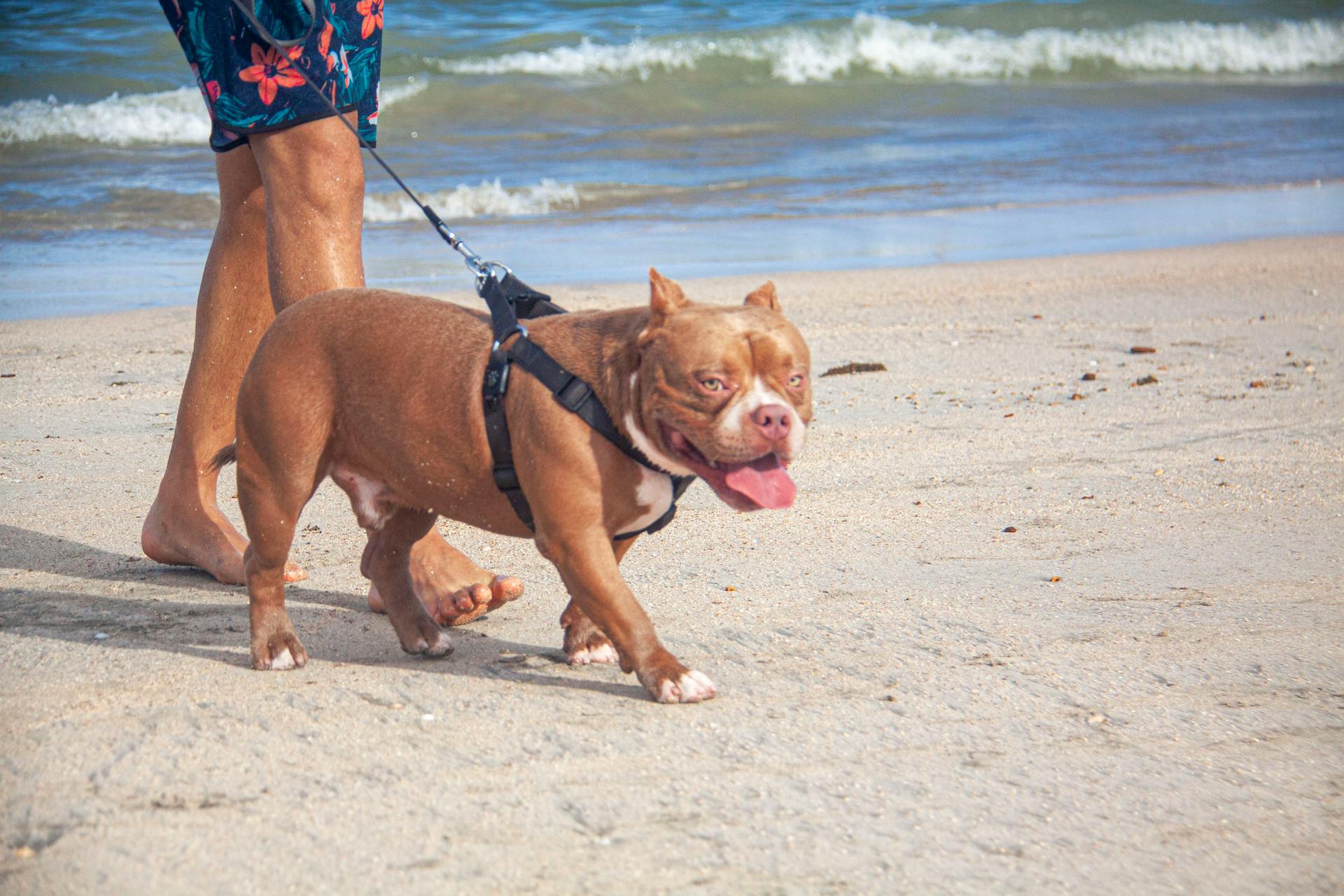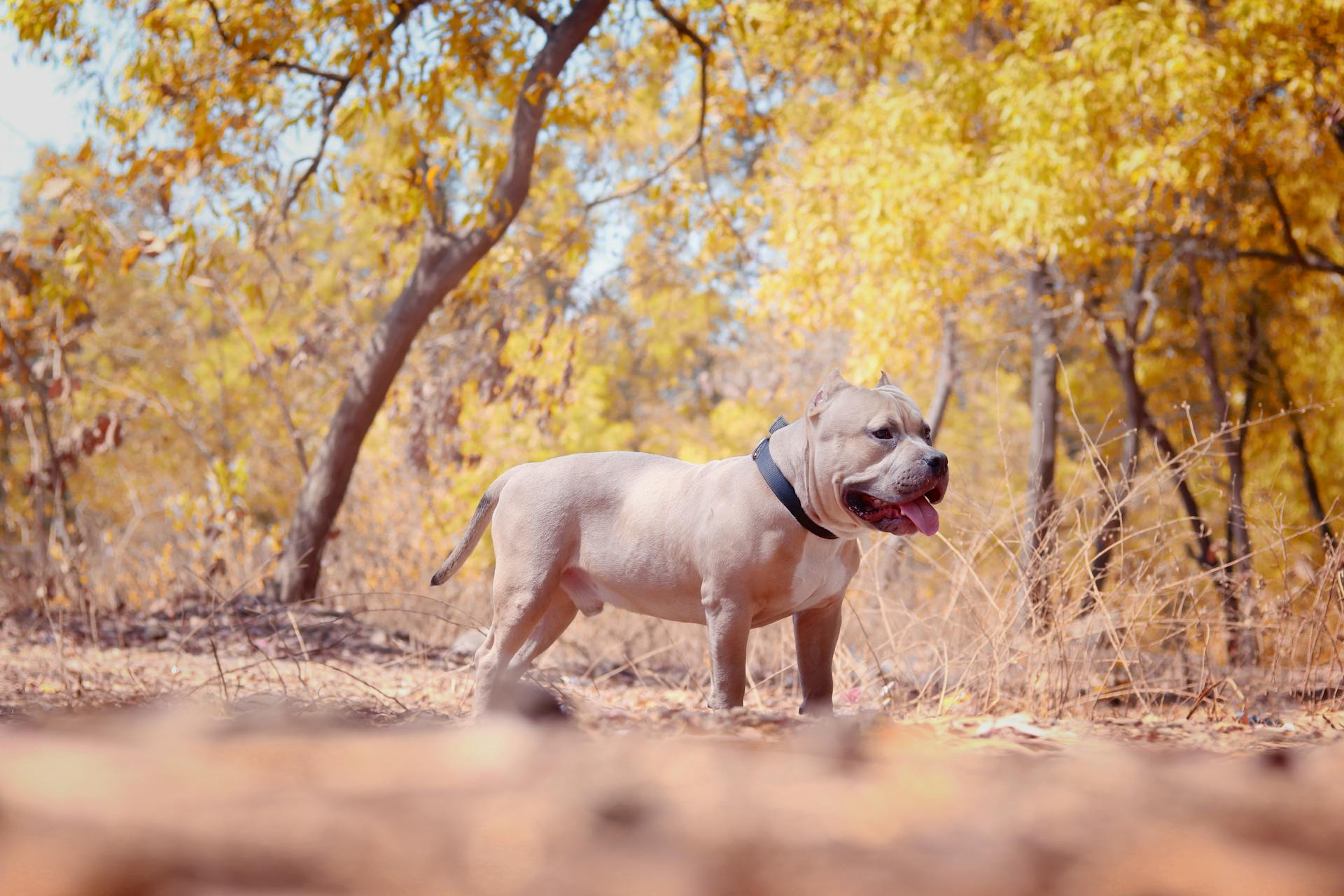
The American Bully breed is known for its robust appearance, but unfortunately, they can also be prone to breathing problems. This is largely due to their brachycephalic skull structure, which can cause their airways to become narrow and constricted.
Their short, pushed-in face can make it difficult for them to breathe, especially in hot or humid weather. This can lead to symptoms like panting, wheezing, and even collapse.
In fact, studies have shown that American Bullies are at a higher risk of developing breathing problems due to their genetic predisposition. This is why it's essential to work with a reputable breeder who prioritizes the health and well-being of their dogs.
To minimize the risk of breathing problems, owners can take steps to keep their American Bullies cool and comfortable, especially during exercise or in warm weather.
Intriguing read: Doberman Pinscher Cold Weather
Causes of Breathing Problems
Brachycephalic airway syndrome is a genetic condition caused by intentionally breeding dogs for a cosmetic appearance of short snouts with flat faces. This results in structural changes to their throats and airways, leading to trouble breathing and overheating.
The American Bully breed, in particular, may suffer from breathing problems due to their brachycephalic airway syndrome. Their anatomically shortened heads can cause obstruction and make them prone to overheating.
Environmental elements like mold, fleas, pollen, and dust mites can also cause allergies in American Bullies, leading to coughing, sneezing, and wheezing.
Why Pups Breathe Fast
Pups breathe fast due to various reasons. Some physical activities, like playing or exploring, can cause their breathing rate to increase.
Puppies take about 15-40 breaths per minute, which is faster than adult dogs. Adult dogs typically take 10-30/35 breaths per minute.
Hyperactive pups, eager to play and explore, breathe even faster. Their high energy levels can lead to rapid breathing.
Underlying medical issues, such as heart failure, respiratory problems, or Cushing's disease, can also cause fast breathing in pups. These conditions require immediate veterinary attention.
Fast breathing can be a sign of congestive heart failure, a disease characterized by fluids building up in the dog's body and putting pressure on the lungs.
For more insights, see: Yorkipoo Adult
Environmental Allergies
Environmental allergies can be a real nuisance for American Bullies.
Mold is a common culprit, causing allergic reactions in these dogs.
Fleas are another environmental element that can trigger allergies, leading to discomfort and distress for your furry friend.
Pollen is a seasonal allergen that can bring on sneezing, wheezing, and coughing in American Bullies.
Dust mites are tiny, but they can cause big problems for dogs with allergies, particularly in homes with carpets and upholstered furniture.
Curious to learn more? Check out: American Bully Food Allergies
Symptoms and Signs
Noisy breathing is a common symptom of brachycephalic airway syndrome, often worse with exercise and in hot or humid weather.
Dogs with brachycephalic airway syndrome may breathe more easily through their mouths than their noses.
Snoring is another sign, often present when relaxed or asleep.
Gagging or retching can occur due to increased airway resistance.
Coughing is a frequent symptom, especially in severely affected dogs.
Tire easily with exercise, as increased effort is required to inhale.
See what others are reading: Do French Bulldogs Overheat Easily
Dogs may collapse or faint after exercise, especially in hot or humid weather.
Overheating is a significant concern, as the ability to pant to lower body temperature is compromised.
Other signs may include pale or blue gums, a result of inadequate oxygen intake.
Here are some common symptoms of brachycephalic airway syndrome:
- Noisy breathing
- Snoring
- Gagging or retching
- Coughing
- Trouble breathing or increased effort to breathe
- Increased panting
- Exercise intolerance (tire easily with exercise)
- Distended abdomen or vomiting from swallowing too much air while working to breathe
- Overheating
- Pale or blue gums
- Collapse
Diagnosis and Treatment
Diagnosis of brachycephalic airway syndrome in American Bullies is based on their breed, clinical signs, and physical examination findings. Your veterinarian will likely notice narrowed nostrils and a low-pitched, snoring-type sound called stertor.
A sedated oral examination may be necessary to evaluate for elongated soft palate and everted laryngeal saccules. An x-ray of the neck and chest can visualize the trachea and assess the heart and lungs.
Your veterinarian may recommend pre-anesthetic blood work and chest X-rays to evaluate your dog's general health and minimize the risks associated with general anesthesia. This is especially important for American Bullies with brachycephalic airway syndrome.
If your dog undergoes general anesthesia to diagnose the condition, your veterinarian will likely recommend that any necessary surgical correction be performed at the same time.
Medical management may be an option if your American Bully's clinical signs are mild or infrequent. This includes weight loss if your dog is overweight or obese, as excess weight can worsen symptoms.
Treatment may also involve limiting exercise and avoiding hot or humid conditions, especially during summer months. Your veterinarian may prescribe corticosteroids, nonsteroidal anti-inflammatory drugs (NSAIDs), and oxygen therapy for short-term relief of airway inflammation or respiratory distress.
Surgery is the treatment of choice whenever the anatomic abnormalities interfere with your dog's breathing. This can include surgically correcting stenotic nares, shortening an elongated soft palate, and removing everted laryngeal saccules.
Multiple procedures may be required to alleviate the signs of brachycephalic airway syndrome, and can be performed at the same time. These procedures include stenotic nares resection, soft palate resection (staphylectomy), and laryngeal saccule removal.
Here are some common surgical procedures for brachycephalic airway syndrome:
- Stenotic nares resection: Surgically widening the nostrils.
- Soft palate resection (staphylectomy): Surgical trimming of the soft palate to shorten the tissue.
- Laryngeal saccule removal: Removing the everted saccules.
Early diagnosis and surgical intervention may help reduce complications of chronic upper airway disease, such as developing laryngeal collapse. Most dogs with brachycephalic airway syndrome are diagnosed by 4 years old, but surgical correction can be performed as early as 4 months of age.
Heart and Respiratory Issues
Fast breathing can be a sign of congestive heart failure in American Bullies, which is characterized by fluids building up in the body and putting pressure on the lungs.
Congestive heart failure can lead to panting, fatigue, difficulties breathing or breathing very rapidly, coughing, and blue gums.
Congenital heart failure can occur in American Pit Bull Terriers, which is often present at birth and can lead to heart failure later in life if not treated.
Heart failure can impact the brain and nervous system, so if you have a genetic diagnosis, regular vet check-ups are crucial.
American Bullies, including micro-bullies, are susceptible to various heart diseases like pulmonic stenosis and mitral valve disease, which can be exacerbated by obesity or heartworms.
Providing a proper balanced diet and being conscious of symptoms can help ensure their healthy heart.
Brachycephalic airway syndrome has been linked to changes in the lungs, including bronchial collapse, which can cause further obstruction.
Gastroesophageal reflux occurs when intestinal fluids flow back into the esophagus, and can be a complication of brachycephalic airway syndrome.
Consider reading: Can Dogs Sense a Heart Attack
Other Potential Problems
American bullies with brachycephalic airway syndrome can experience changes in their lungs, including bronchial collapse.
Bronchial collapse occurs when the bronchi weaken and collapse, causing further obstruction.
Gastrointestinal problems like gastroesophageal reflux and chronic gastritis are also linked to this syndrome.
Gastroesophageal reflux happens when intestinal fluids flow back into the esophagus, the tube that connects the throat to the stomach.
Discover more: When Do Goldendoodles Go into Heat
Medication Side Effects
Sedatives and pain relievers can lead to breathing problems in your furry friend. This is especially concerning if your dog has a pre-existing heart issue or anemia.
In most cases, these medications don't cause labored breathing if used properly. However, if your dog has an allergic reaction, breathing problems may occur.
Internal bleeding is another potential complication that can arise from medication use. As a responsible pet owner, it's essential to monitor your dog's health closely during and after treatment.
Ear Infections
Ear infections are a common problem in American Bullies, often caused by ear mites, bacteria, or allergies. These infections can lead to smelly discharge from the ear or itchiness, which can be uncomfortable for your dog.
Ear mites are a common culprit behind ear infections in American Bullies, and they can cause intense itching and irritation. If you notice your dog scratching at their ears excessively, it's a good idea to take them to the vet to get checked out.
Allergies can also contribute to ear infections in American Bullies, and symptoms can include redness and swelling in the ear area. If you suspect your dog has an allergy, it's essential to work with your vet to develop a treatment plan.
In some cases, ear infections can be caused by bacteria, which can lead to a strong, unpleasant odor from the ear. Regular ear cleaning and checking can help prevent bacterial ear infections.
Other Potential Problems
Brachycephalic airway syndrome can lead to some serious issues beyond just breathing difficulties. Bronchial collapse is one such problem, where the airways that connect the trachea to deeper airways of the lungs weaken and collapse, causing further obstruction.
Gastrointestinal problems are also common in dogs with brachycephalic airway syndrome. Gastroesophageal reflux occurs when intestinal fluids flow back into the esophagus, the tube that connects the throat to the stomach.
A fresh viewpoint: Tracheal Collapse Natural Treatment
American Bully Health
American Bullies are generally a healthy breed, but they do require regular exercise to stay fit and happy. 30-60 minutes of moderate exercise daily is sufficient to keep your Bully at a healthy weight.
However, it's essential to avoid high-impact activities like jumping or running on hard surfaces, as this can harm their joints due to their heavy build. Always use a leash when exercising your Bully outdoors to maintain proper control.
A balanced diet is also crucial for maintaining the health of your American Bully. Adult Bullies should consume around two cups of high-quality, high-protein dry food daily divided into two meals.
Here's an interesting read: High Fiber Dog Treats Recipe
Micro Bullies and Health
Micro Bullies may suffer from some health issues, including joint problems, breathing problems, skin diseases, eye problems, and hypothyroidism.
Brachycephalic airway syndrome is a particular set of upper airway abnormalities that affect brachycephalic dogs, including Micro Bullies. This syndrome is caused by abnormalities such as stenotic nares, extended nasopharyngeal turbinates, elongated soft palate, laryngeal collapse, everted laryngeal saccules, and hypoplastic trachea.
Micro Bullies require a high protein and essential fat-rich balanced diet for their optimum muscle growth. This diet should be tailored to their weight and age to prevent bloating or obesity issues.
Regular exercise is essential for keeping Micro Bullies fit and happy, but excessive exercise can harm their joints due to their heavy build. A daily 30-60 minute moderate exercise routine, such as brisk walks or playing fetch, is sufficient.
Micro Bullies also require access to fresh water to prevent dehydration, which can lead to various health issues. Overfeeding treats and limiting table scraps can contribute to weight gain and upset their stomachs.
Take a look at this: American Bully Raw Diet Recipe
Normal Puppy Breeding Rate
Puppies breathe faster than adult dogs, with rates ranging from 15-40 breaths per minute.
Their breathing rate is individual, so it's best to consult a veterinarian for specific information about your puppy's needs.
Adult dogs take between 10-30/35 breaths per minute.
Take a look at this: Adult Puggle
Veterinary Care and Costs
Regular veterinary check-ups are crucial to ensure your American Bully remains healthy. Schedule these check-ups to keep up with vaccinations and parasite control.
Veterinarians recommend checking for any signs of respiratory issues, such as difficulty breathing or rapid breathing. Monitor your dog's overall health closely, just as the article suggests.
The "Roadmap to optimal dog health" emphasizes the importance of regular veterinary care. By following this roadmap, you can navigate any health concerns with confidence.
When to Consult a Veterinarian
If you notice your dog is breathing rapidly even when they're resting, or they're panting with a closed or not fully opened mouth, contact a veterinarian immediately.
Coughing, retching, and wheezing are other signs of underlying health conditions that require a vet check.
If you think your dog may have eaten something toxic, such as chocolate, garlic, or onion, call a veterinarian right away.
Dogs can be curious and swallow non-edible items, which can be potentially life-threatening.
Veterinary Care
Regular veterinary check-ups are essential to ensure your dog remains healthy. Schedule visits every now and then to keep up with vaccinations, parasite control, and other recommended healthcare measures.
The American Bully is a breed that requires close monitoring to prevent health issues. Owners should constantly keep a close eye on their American XL Bully.
A complete blood count, serum blood chemistry, and urinalysis are likely recommended for a baseline evaluation. This helps your veterinarian get a better understanding of your dog's overall health.
Your veterinarian may want to perform a sedated oral examination to evaluate for elongated soft palate and everted laryngeal saccules. This can help identify potential issues early on.
Stenotic nares, or narrowed nostrils, can be a sign of brachycephalic airway syndrome. A low-pitched, snoring-type sound called stertor may also be noted in dogs with this condition.
Early correction of stenotic nares and/or an elongated soft palate will significantly improve airway function. This can prevent the development of everted laryngeal saccules and improve your dog's quality of life.
For your interest: English Bulldog Soft Palate Surgery
Surgery Cost
The cost of surgery for brachycephalic airway syndrome can vary depending on many factors, including geographic location, how sick the dog is, and how extensive the procedure needs to be.
Pet parents can likely expect to pay a total between $3,000 and $5,000 if all three procedures are performed.
Pet insurance may be a good idea to help offset anticipated costs and illnesses related to getting a new pup.
Not all policies offer coverage if conditions are considered pre-existing, so make sure to check if your policy covers brachycephalic dogs and brachycephalic airway syndrome.
If this caught your attention, see: Preventative Care Keeping Your Pet Healthy Year-Round
Frequently Asked Questions
How do I help my dog who is struggling to breathe?
To help your dog breathe more easily, position their head and neck in a straight line or use pillows to prop them up. This simple adjustment can make a big difference in their comfort and breathing.
Is it normal for American Bullies to pant a lot?
While panting is normal for American Bullies, heavy panting can be a sign of overheating, health issues, or trauma, so it's essential to monitor their behavior and seek veterinary care if you notice any unusual signs.
Sources
- https://www.servicedogtrainingschool.org/blog/puppy-breathing-fast-while-sleeping
- https://vcahospitals.com/know-your-pet/brachycephalic-airway-syndrome-in-dogs
- https://www.petmd.com/dog/conditions/respiratory/brachycephalic-airway-syndrome-dogs
- https://dogsbestlife.com/dog-breeds/american-bully-health-issues/
- https://americanbullyadmirer.com/micro-bully/
Featured Images: pexels.com

